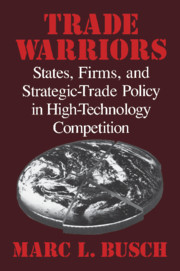7 - Conclusion
Published online by Cambridge University Press: 06 July 2010
Summary
The theory and practice of strategic-trade policy present us with a puzzle. On the side of theory, states are argued to have a strong incentive to fight for their national champions in high-technology industries, but are seldom expected to follow through, given the threat of foreign retaliation. In practice, however, states do fight for their national champions in certain high-technology industries, and at times go unchallenged. Moreover, when states do fight, they sometimes cooperate with each other to ease trade tensions, even though the risk of foreign retaliation did not deter them from intervening in the first place. Why this gap between theory and practice? The book provides answers to this puzzle by elaborating the strategic-trade calculus of states. This chapter takes up some of the more salient implications of the argument, considers the book's limitations, and draws out several policy prescriptions.
IMPLICATIONS OF THE STUDY
This book argues that externalities inform the state's strategic trade calculus. It argues, more specifically, that states subsidize the exports and (or) R&D of national champions in those industries exhibiting externalities that the domestic economy is primed to make use of, given a presence upstream and downstream. The level at which these national champions are subsidized depends, in turn, on whether the resulting externalities diffuse beyond national borders, and whether foreign trade rivals are primed to make use of these benefits as well. This argument hits squarely on two themes in the strategic-trade literature: the role of the state, which is important in theorizing about foreign economic policy more generally; and the import of externalities, which figure centrally in the literatures on endogenous growth and economic geography (among others) as well.
- Type
- Chapter
- Information
- Trade WarriorsStates, Firms, and Strategic-Trade Policy in High-Technology Competition, pp. 141 - 150Publisher: Cambridge University PressPrint publication year: 1999



